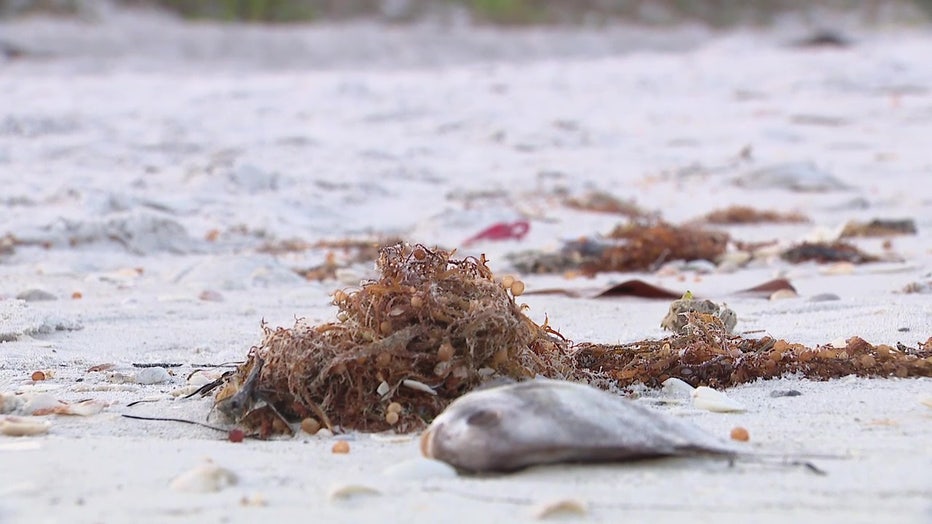Florida red tide: American Lung Association provides tips on protecting yourself from respiratory issues
INDIAN ROCKS BEACH, Fla. - It’s the time of year when you might find yourself coughing a lot on the beach.
Varying levels of red tide are being reported in a number of counties along the Gulf coast, according to the Florida Fish and Wildlife Commission.
Red tide doesn’t bring concerns only for wildlife, but also health concerns for people at the beach. If you find yourself coughing or having shortness of breath or finding dead fish lining the beach, those are all indicators of red tide.
The American Lung Association is warning people, that it can cause respiratory issues.

Red tide impact on spring break season
Red tide has been detected from Tarpon Springs to Naples during a time in which many tourists flock to Gulf Coast beaches.
RELATED: How will red tide impact spring break?
Dr. Danielle Mercurio, an emergency medicine physician at Johns Hopkins All Children’s Hospital, said the effects of red tide have more of an impact on people who already have underlying respiratory issues.
"Such as asthma," Dr. Mercurio noted. "They generally tend to have respiratory symptoms. So, some cough, some runny nose, sometimes some shortness of breath, and difficulty breathing. There’s another population of patients that sometimes have some nausea. They just don’t feel well."
She said they usually see an influx of cases believed to be related to red tide around this time of year, but thankfully, she says most symptoms aren’t serious.

Dead fish washed up on shore from red tide.
FWC officials said varying concentration levels of red tide have been found at beaches in Hillsborough, Pinellas, Manatee, and Sarasota counties.
"We’ve definitely been coughing the whole time, but I’ve heard stories of fish kill and everything, and there hasn’t been any of that. And you can’t tell from the water that it’s red or anything, so it hasn’t been bad in that way, but we’ve definitely felt it in our lungs," said Abby Hays, who was visiting the beach in Pinellas County.
The FWC says concentration levels of red tide in Pinellas County range from minimal to high concentration.
"We were at Sarasota beach or Siesta Beach and there were blowfish and a ton of different kinds of fish all over the beach. I’ve never seen that many fish on the beach before, but in the water, it was all fine," one beachgoer said.

Scientists use clay to stop effects of red tide
Two years after scientists first field tested a clay mixture to mitigate red tide, they are looking back on what they learned in Sarasota County and preparing for a new field test.
"The symptoms can linger," explained Dr. Mercurio. "It really depends on your body itself and how long it’s able to rid, or how long it’s exposed to the algae."
She said most symptoms usually go away after you leave the beach. If symptoms linger and you have underlying respiratory issues, adding that they can prescribe medications like an inhaler or steroid to help with any inflammation.
"Mostly just coughing for us," said Corrine Hays, who was visiting the beach in Pinellas County. "I said I come to the beach and I immediately feel a tightening in my lungs, but it’s just coughing while we’re here. Once we leave the beach, I’m fine."
Unfortunately, doctors said there’s not much you can do to prevent this feeling, other than avoiding areas affected by red tide. The American Lung Association offered the following tips:
- Avoid Red Tide Areas: Swimming in water experiencing red tide or breathing in tiny droplets in the air that contain toxins can negatively impact your lung health. If you think you are sensitive to this toxin, avoid or limit your time exposed to these areas.
- Don’t Exercise Outside: If you have a lung condition or are impacted by red tide, and live near the beach, do not exercise outside when the red tide is present. Additionally, keep your doors and windows shut to prevent the toxic fumes from entering your house.
- Action Plans: If you have asthma, review your asthma action plan with your physician and your family. If you don’t have one yet, learn more about Asthma Action Plans to get started today at Lung.org/Asthma.
- Medications: During times of red tide, make sure you continue taking your regular medications and keep your quick relief or "rescue" inhaler with you at all times in case of symptoms.
- Keep an eye out for symptoms. People may develop health problems during red tide, even if they've never had them before. Be aware of any symptoms that may arise, including: Respiratory irritation (coughing, sneezing) Shortness of breath Throat irritation Eye irritation Skin irritation Asthma attacks
- Respiratory irritation (coughing, sneezing)
- Shortness of breath
- Throat irritation
- Eye irritation
- Skin irritation
- Asthma attacks
You can find the concentration levels of Red Tide at beaches in your area on the FWC website.


